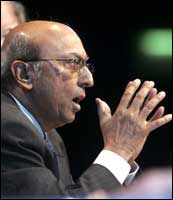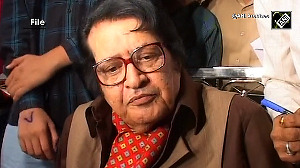 As far as one can remember, Tarun Das has been the face of the Confederation of Indian Industry, having served as its chief executive and then director-general for more than three decades.
As far as one can remember, Tarun Das has been the face of the Confederation of Indian Industry, having served as its chief executive and then director-general for more than three decades.
But since his retirement in June 2004, he has been the chief mentor of the CII, easily India's leading industry lobbying group, and recently launched the Indian American Council, even convincing his close friend and telecom icon Sam Pitroda to be its chairman.
The IAC is envisaged as a facilitator for Indian Americans who wish to invest some of their time, energy and intellect in India. According to Pitroda, the objective of this organisation is to tap 'the emotional quotient' of Indian Americans and 'help structure their connection and engagement with India.'
In an exclusive interview with rediff India Abroad, Das, who is a regular visitor to Washington DC., and earlier this month accompanied Science and Technology Minister Kapil Sibal to the United States along with a high-powered Indian bio-technology delegation under the auspices of the CII, acknowledged that the IAC is one of his most ambitious projects.
It is also very close to his heart because the focus is on India's development at the grass-roots level in areas such as education, health, and other social infrastructure projects.
He said that if 100,000 Indian Americans can be co-opted to join IAC as members and give some of their time and talent, they could make an unimaginable difference in the lives of millions of people in India, particularly in the rural parts of the country. Das said that the IAC, which is essentially a delivery system and bridge-builder provides Indian Americans with an opportunity by matching 'an emotion and sentiment' with a need in India that is crying out for their talent and expertise.
An honours graduate in economics and commerce from Calcutta University and Manchester University in the United Kingdom, Das has spent his entire career in industry associations, starting with the predecessor body of CII in November 1963.
He has been awarded an honorary doctorate in science by the University of Warwick in the United Kingdom, and has been conferred an honorary CBE by Her Majesty the Queen for his contribution to Indo-British relations.
Das is also the first-ever recipient of the 'Blackwill Award' named after former US Ambassador to India, Robert Blackwill, given by the US-India Business Council for his contributions to Indo-US cooperation. Excerpts:
What exactly is the Indian American Council and how did this concept come about? And, what do you hope to achieve with it?
Between Sam (Pitroda), Kiran (Pasricha, deputy director general, CII) and myself, we wanted to develop a structured, systematic, and sustained way of connecting Indian Americans into India on development matters. Like there are people originally from Bihar in the US who want to be engaged with Bihar. So, we have set up projects for primary education, rural development and all in Bihar, where they can contribute not necessarily with money - this is not a fund-raising organization - but with ideas.
There are guys from the Massachusetts Institute of Technology who are helping with e-learning and e-governance in India. So it's know-how, it's knowledge, where people take about three months off, maybe one semester, and spend it in India to help us. So, that's where we are coming from.
There is a lot of expertise here in the US among Indian Americans. There are a lot of ideas, lots of knowledge, and we need that.
So what's new about it, because aren't several other groups, from alumni organizations to second-generation outfits like IndiCorps, doing similar work?
No. There is nothing like the IAC so far, which is very structured and focused only on development issues like education, health, water etc. Others are doing fund-raising and maybe giving money and all that.
But we are going to do actual work. On our website you'll find over 100 projects identified in India where Indian Americans can connect into.
What do you expect these Indian Americans to do? Give of their time by coming over there for certain fixed periods of time.?
Not necessarily, but they are interested in doing that. For example, we sent a letter out to vice-chancellors of Indian universities, saying, 'Do you want to connect with Indian Americans? What do you want them to do?'
Fifty of them have said 'We'd like them to come and speak to our faculty and our
So for these Indian Americans, it's essentially going to be a labour of love? Spending their own time, own money?
Yes, it's definitely a labour of love, that's right. We are making the connections -- the platform and the connection.
I guess it helps to have a high profile guy like Sam Pitroda heading this Council. But what role is he going to be playing besides lending his name, which I am sure gives the Council a lot of credibility?
Absolutely. He is taking meetings of the governing council every month. So, he is giving time, he is giving ideas, he is giving direction to us.
Sam being there is a tremendous asset because he has been down this road, with his telecom revolution days - started small and created the revolution and all that. He is interested that Indian Americans as a bunch make these revolutions in India.
And we think we can have a 100,000 Indian Americans as members - out of the more than two million plus Indian Americans - a 100,000 Indian Americans getting engaged in different states, different programs, different projects. They will be able to make such a significant difference to India and they will feel so good about it.
In terms of CII's involvement, what tangible role will it play?
We are essentially the delivery system.
And, obviously this is very close to your heart?
You bet, very much. This is what it's all about. Because this is one way where Indian Americans can make a tangible, tremendous contribution to India. . . because we cannot leave development issues only to the government.
There has got to be these supplementary efforts to whatever the government is doing. And these people -- whether they be from the IIT alumni organizations, or the Indian-American physicians' organizations, or academia at the top universities and college -- have so much talent and they so much want to do something for India, to help make a difference.
In fact, at the Pan-IIT event where the CII co-hosted Science and Technology Minister, Mr Kapil Sibal, I met several young people, whose parents are involved in several projects in India, in development areas such as education.
In fact, one person, whom I met, is running a school in Western UP (Uttar Pradesh) and he wants to do so much more. So, here is an opportunity, where people have got an emotion and a sentiment and India has got a need -- and CII will be the bridge.
You had much discussions with Pan-IIT, spanning several hours and Sam, in fact, even though he couldn't make it to Washington since he had to undergo surgery, conducted a video conference for several hours with the alumni. What specific role do you expect Pan-IIT to play?
Pan-IIT is going to do a lot of work. In our meeting that ran into several hours, Pan-IIT people gave us about 15 new ideas for connecting into India. So we are going to work with Pan-IIT to connect them into India.
The feedback has been so positive because the environment is essentially to connect successful Indian Americans into India, and not for trade, not for investment, not for their money, but to get connected into education, health, technology, water, energy, which as you know, are the big challenges of development that we face in India today.
But as I asked you earlier, isn't this a case of re-inventing the wheel because like other organizations, the IITs have got their own alumni associations doing their own thing with their individual alma maters and also on a collective basis. So, won't this clash with their work or in some sense, duplicate the work they are doing and only create a bureaucracy of sorts?
Not at all. There will be nothing like that because we will work together. We will support them, and it will not take away from anything they are doing. IIT is a great brand. We want to support the brand, we want to reinforce the brand.
We will be their leg, but they will be the front on that, as much as other leading Indian American groups like the physicians and so on would take the lead but we will be the bridge and provide the direction to the innumerable development projects that they could do with their expertise and talent to make a difference to alleviate the lot of the Indian population at large be it health, education, and such development issues, and thereby supplement the resources the government is infusing into these vital social infrastructure projects.






 © 2025
© 2025